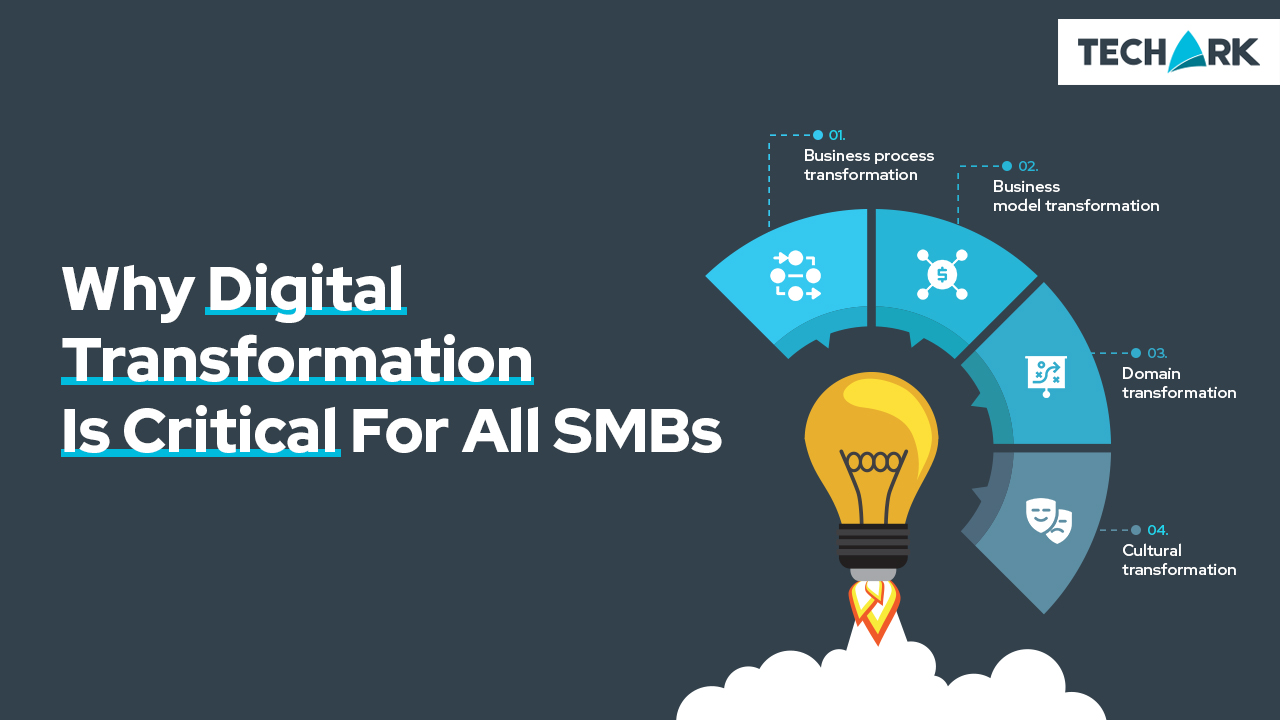Contact Us
Send Us a Message
Need expertise and innovation on your project? Our team can help.
In our first article in this series, we talked about what Digital Transformation is. In this article, we will address why it is so important that small and medium businesses embrace digital transformation in all its aspects.
Enterprise level organizations have embraced digital transformation, however, most small and medium enterprises are skeptical that the investment will pay off. They realize the need for improved and streamlined processes in order to compete, but face issues the big businesses don’t have, namely, the resources to deal with complexity, lack of in-house skills and expertise, and tight budgets. Additionally, most SMBs are run by the owner and the time to implement digital transformation strategies takes a back seat to managing the business from day to day. This makes it very easy to think of digital transformation as “one of those things we’ll get to one day”.
Table of Contents
Reasons not to delay
Traditionally, businesses needed to rely on advertising, word of mouth, and signage to promote their brand. Internal processes relied on spreadsheets, documents, and (gasp!) paper. Digital transformation is about moving from old processes that bottleneck productivity to newer, more efficient processes that streamline processes and have huge impacts on productivity.
And things are (and have been) changing quickly. Those that embrace the incoming wave of digital transformation tools will be ahead of their competitors.
- According to Gartner, “Eighty-seven percent of senior business leaders say digitalization is a company priority, and 79% of corporate strategists say it is reinventing their business — creating new revenue streams in new ways.”
- The economic value of digital transformation is expected to reach $100 trillion by 2025.
- Nearly 71% of leaders firmly believe that the role of the workforce is crucial in implementing digital transformation.
- In a survey conducted by Techaisle reported that a fifth of over 3,600 SMBs the disruptions caused by the pandemic had amplified their belief in organization-wide digital transformation, leading them to look at it more holistically and strategically.
As CIO puts it: “Digital transformation is no longer synonymous with striving toward a structural or radical change by replacing and rebuilding systems and processes. Rather, it now resembles any other business function – with the goal of enabling continuous innovation across departments.”1
Digital transformation must be done correctly to reap value
Today, having a digital presence is a must. A website by itself is not enough – everyone has one. However, a thoughtful website that is built with your end users and customers in mind and helps push them deeper into your sales funnel is a must for your business, along with a presence on other digital platforms your customers regularly visit. Along with having a website, you also need to make sure that your website is optimized for mobile devices. As per Google’s 200 ranking factors, mobile-friendliness is one of the significant things to take into consideration, and there are now 3.5 billion smartphone users.1
Organizations can put themselves on the road to digital transformation and foster a digital culture with a few simple steps2:
- Always keep in mind your primary (and secondary) objective for transformation
- Directly addresses employees’ concerns about technology and change
- Work with a partner or MSP who has experience in effecting digital transformation, either for themselves or for a client
- Always focus on transforming the customer journey first, by making it quicker and simpler
- Stay aware of technology enablers in the market. Encourage agility and innovation in the organization
- Facilitate and reward inter-departmental collaboration
SMBs are seeing value in stepping up investments in digital transformation with specific primary and secondary objectives.
Where to start?
Again, from CIO1, there are four basic categories of digital transformation that should be addressed:
Business process transformation
Business processes are the most basic units of operations that benefit from improved or evolving technologies such as AI and machine learning, AR/ VR, and hybrid clouds, as well as the analytics, services, and APIs associated with these technologies. Ultimately, these mini-transformations result in specific KPIs such as better product quality, less cost per unit produced, or faster delivery.
Business model transformation
You can find dozens of examples today of how technology is enabling startups to turn traditional business models on their heads while delivering more value to consumers. Netflix (video distribution), iTunes (music distribution), Uber (taxis), and Airbnb (hotels) are some that race to the top of the mind.
Using the building blocks of processes transformation – like AI and analytics – these companies are continuing to accelerate change in the already transformed business models.
Domain transformation
The biggest survival ability of a startup or a small business is its propensity to pivot – or venture out into a new domain of business. Twitter launched as a podcasting platform, YouTube started out as a video dating site, and Starbucks began life selling coffee beans.
You don’t always need to change your core domain; you can add another product or service range to your core offering using technology that you understand or use. For example, Shopify successfully added hosting services to its ecommerce framework and is now a one-stop solution for online retailers.
“As you’re thinking about transforming a company, try to realize those cores, those gems that you have that you can pivot off of to create that next chapter,” said Pitney Bowes CEO Mark Lautenbach as they developed a new, customer-facing commerce cloud to allow smoother payments.
New technology can unlock untapped opportunities and new markets for your business, especially if you have a lean operational structure. Domain transformation perhaps creates more value than any other category of business transformation.
Cultural transformation
Technology drives change, but people drive technology. True digital transformation happens when you have agile workflows, decentralized decision-making, and an engaging company culture that promotes learning, testing, risk-tolerance and openness to change.
Most of all – and this bears endless repetition – it needs to spring and flow from the top.
Most SMBs stop in their tracks when they hear “digital transformation” because of the perception that it is something complex beyond the grasp of their limited resources.
Benefits
So, where does all this get an SMB? It’s obvious that digital transformation is here and here to stay. In fact, it is fast becoming a vital part of every organization’s strategy plan. What are the benefits, other than keeping up with competitors?
Cost savings and increased productivity
Savings come in the form of moving common practices, which often include manual or paper-based activities, to digital processes. These provide increases in productivity, lessen lead conversion times, and provide relevant, useful and clean data that can be used to make more accurate and timely business decisions. This leads to eventual digital transformation with permanent and wide-ranging implications.
SMBs can realize the benefits of digital transformation by identifying their most pressing problem – the biggest threat to their survival, if you will – and dealing with it first. “Take your business and break it down into smaller chunks and start building things. And don’t solve problems that don’t exist yet, that you haven’t yet faced,” advised Pieter Jordaan, CTO of TUI Group.2
More engaged employees
While it may seem counterintuitive to think that streamlining processes would lead to higher employee engagement, think of it this way: employees that are not bogged down by clumsy processes have more time to dedicate to further improving processes, leading to more conversation about how business is conducted. This level of engagement is dreamed of by many companies and digital transformation can help any organization get there.
Final thoughts
If you are thinking about how your organization can reap the benefits of digital transformation or if you’ve already started your journey and need some help, reach out to TechArk. We have fully embraced the digital transformation world and have helped many organizations find truly impactful solutions to their outdated processes, including Sentara, Currituck County Game Commission, Health In Color, and many more.
Let us help you start or continue your journey.
References
- https://www.cio.com/article/188971/are-smbs-invited-to-the-digital-transformation-party.html
- https://www.nutanix.com/theforecastbynutanix/business/can-smbs-benefit-from-digital-transformation
- https://www.forbes.com/sites/forbestechcouncil/2020/03/17/why-digital-transformation-is-a-necessity-for-all-smbs/?sh=7bbd734b3680
About TechArk Solutions
Founded in 2012, TechArk Solutions specializes in website design, digital marketing, and custom software solutions for businesses across the United States and beyond. Headquartered in Norfolk, Virginia, the company comprises a global team of experts dedicated to growth, innovation, and quality. To learn more, email hello@gotechark.com or visit https://gotechark.com.



